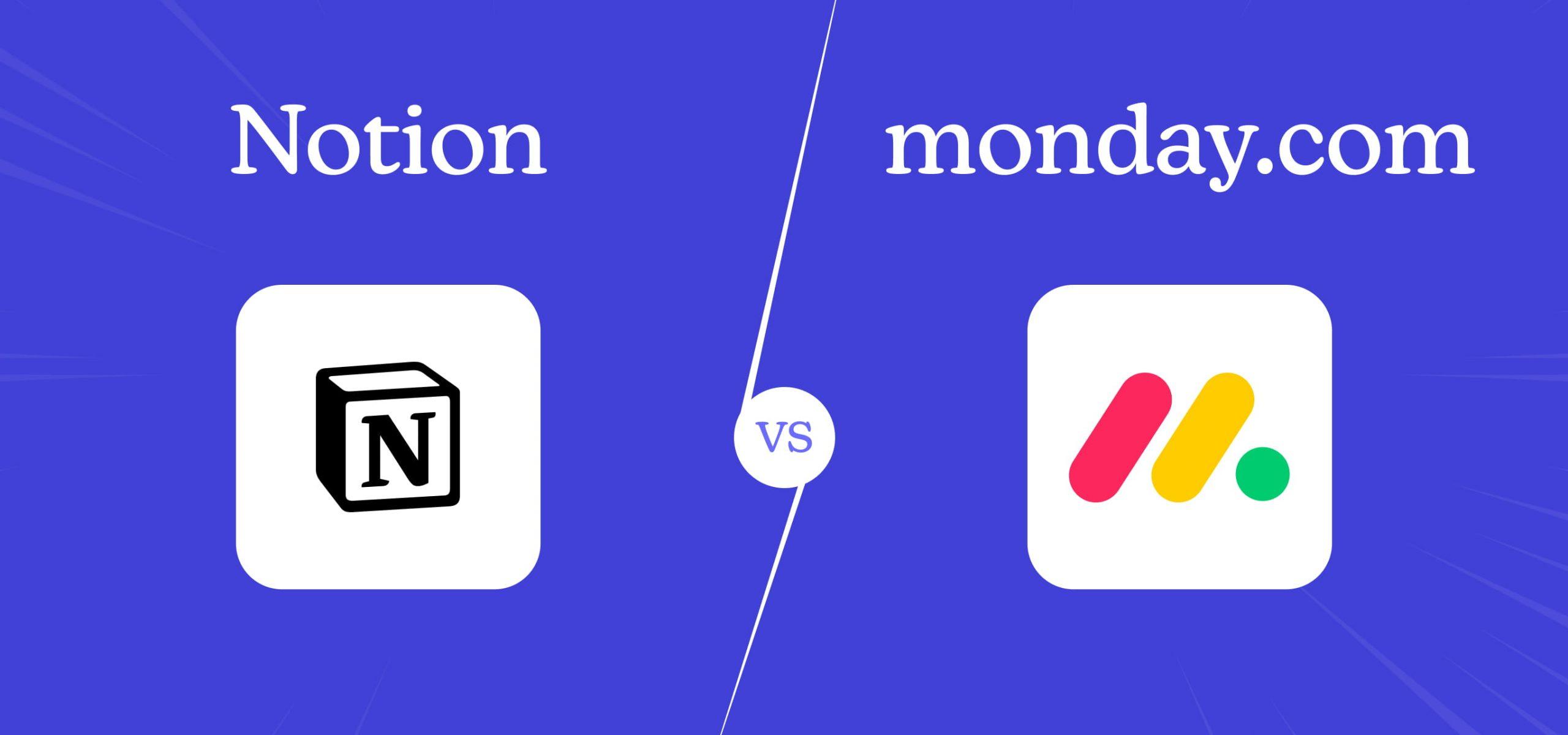
Notion vs monday.com 2025: Complete Feature Comparison Guide
Summary: If you are confused between two most popular project management tools, Notion vs. monday.com, we get you. We get that it is difficult to make the right choice and work peaceful. This blog compares notion and monday.com based on their feature, pricing, automation, ease of use and more.
You’re drowning in a sea of sticky notes, having an overflowing inbox, and missed deadlines😢. Your team is scattered across continents, working on projects that feel more like tangled messes than operating smoothly. Do all these things sound familiar?🤔
In the cavalry of productivity tools rides two valiant steeds – Notion and monday.com. Both promise to help you get rid of disorganization and usher in an era of project management bliss. But with two such powerful options, how do you choose the right one?
We’re here to be your trusty guide. This blog will compare their features, target audiences, and pricing structures, leaving you equipped to make the right decision .
How We Analyzed and Compared Both These Platforms?
We evaluated and compared both Notion vs monday based on our experience. We thoroughly tested the software and analyzed features, functionalities, user-friendliness, pricing plans, and ease of use. Additionally, we considered G2 reviews and ratings, as well as the overall user experience. Our extensive research and effort were dedicated to providing a detailed comparison of each feature and functionality, making it easier for you to assess both platforms.
A Quick Feature Comparison
Need a quick snapshot of how Notion and monday.com stack up? Look no further! This table compares their core functionalities to help you determine which platform best suits your project management and productivity needs.
| Feature | ||
|---|---|---|
Time Tracking | No (requires integration) | No (requires integration) |
Templates | 200+ | 10,000+ |
Ease of Use | Highly intuitive and user-friendly | Clean interface, may require some learning |
Time Tracking | Table, Map, Gantt chart, Calendar, Kanban, List, Timeline, etc. | Table, Calendar, Kanban, List, Timeline, Gallery |
Milestone | Yes | No |
Note-taking | No | Yes |
Project views | Table, map, Gantt chart, Calendar, Kanban, list, timeline, etc. | Table, Calendar, Kanban, list, timeline and Gallary view. |
| Risk Management | Yes | No |
| Wiki | No | Yes |
Free version | Yes | Yes |
| Rating | 4.7 Star | 4.7 Star |
Try monday.com |
In-detail Feature Comparison Between Notion and monday
1. Project View
Project views are crucial for visualizing and managing tasks within your project management tool. Here’s a detailed breakdown of how Notion and monday.com stack up in this critical area:
 |  |
| Multiple Views: Table, Calendar, Kanban, List, Timeline, Gallery | Multiple Views: Table, Calendar, Kanban, List, Timeline, Form, etc. |
| Map View: Not available | Map View: Available on Standard plan or higher; visualizes project data on maps for geographic insights. |
| Gantt Chart: Not available natively; timeline view can simulate Gantt charts but lacks full functionality. | Gantt Chart: Available; full Gantt chart functionality with tasks, timelines, durations, milestones, and dependencies. |
| Gallery View: Available; visually organizes items in a grid, useful for visual project management. | Gallery View: Not available; similar functionality can be achieved with the “Cards” view but less visually oriented. |
2. Templates
Pre-made templates can jumpstart your project management journey by providing a structured foundation. Here’s a table comparing Notion and monday.com’s template offerings:
 |  |
| Pre-made Templates: Extensive library of pre-made templates for various personal and business uses. | Pre-made Templates: A complete set of pre-made templates primarily focused on business and project management. |
| Range of Industries: Offers templates for a wide range of industries and departments, including personal use. | Range of Industries: Provides templates for a wide range of industries and departments, focused on professional use. |
| Examples of Templates: Reading tracker, blog editorial calendar, recruitment tracker, simple budget, and more. | Examples of Templates: Project management, marketing campaigns, CRM, product development, HR management, and more. |
| Versatility: Extremely versatile, suitable for a variety of use cases beyond project management. | Versatility: Versatile within the realm of project management and business operations. |
| Community Templates: Access to a large community-driven template library, offering a diverse range of user-generated templates. | Community Templates: Primarily offers templates created by the monday.com team, focused on standard business processes. |
3. Ease of Use
Learning a new tool shouldn’t be a hurdle. Here’s a table comparing the ease of use for Notion and monday.com:
 |  |
| User Interface: Less vibrant, modern, and clutter-free; can feel dull and challenging to navigate initially. | User Interface: Visual, colourful, playful, and inviting; full of colourful elements making it appealing to use. |
| Learning Curve: Steep learning curve; requires more searching and clicking to locate features. | Learning Curve: Simple learning curve; easy setup and management for users with zero experience. |
| Dashboard Design: Modern-looking; highly customizable but can become cluttered without best practices. | Dashboard Design: Colorful, inviting; intuitive design with a structured way of doing things. |
| Intuitiveness: Requires more time to get used to; expert users appreciate its flexibility and customization. | Intuitiveness: One of the most intuitive and easy-to-use project management tools; grasp basics quickly. |
4. Note Taking
Effective note-taking and document management are crucial for project success. Here’s how Notion and monday.com compare in this area:
 |  |
| Document Creation: This does not support direct document creation; it requires external document creation and linking. | Task List Functionality: Basic task management; lacks comprehensive task list functionality like Notion. |
| Filters and Collaboration: Ability to create filters, share tasks via Slack channels, apply creation dates, and track edits. | Filters and Collaboration: Basic file management options; lacks advanced filtering and collaboration features. |
| Note-Taking Capabilities: Superior note-taking and document organization; easy to capture and access vital information. | Note-Taking Capabilities: Limited note-taking capabilities; focuses more on task and project management. |
| Document Creation: Allows direct document creation within the app; supports dedicated spaces for various document types. | Document Creation: Does not support direct document creation; requires external document creation and linking. |
| Knowledge Base: Can create a centralized wiki for SOPs and other important documents; ideal for team knowledge base. | Knowledge Base: No built-in functionality for creating a centralized knowledge base; relies on external links. |
| Status Properties: Can set status properties (To-do, Doing, Done) and easily move tasks between statuses. | Status Properties: Basic status tracking; not as detailed or flexible as Notion. |
| User Experience: Intuitive and easy to use for note-taking and document management; reduces the risk of misplacing notes. | User Experience: Focused on visual task management; less intuitive for note-taking and document organization. |
5. Team Collaboration
Seamless teamwork is essential for project success. Here’s a breakdown of how Notion and monday.com stack up in terms of collaboration features:
 |  |
| File Sharing: Allows creating and sharing documents within the workspace. | File Sharing: Supports file sharing with team members. |
| Real-Time Collaboration: Shows real-time edits with avatar icons indicating who is editing which block. | Real-Time Collaboration: Provides robust real-time collaboration features but doesn’t show real-time edits as clearly as Notion. |
| Granular Sharing: Allows sharing individual pages with specific members, offering customizable access levels. | Granular Sharing: Allows sharing boards and tasks but lacks the granular page-level sharing options of Notion. |
| Overall Collaboration: Provides flexible and customizable collaboration features, suitable for various team needs. | Overall Collaboration: Offers robust collaboration features, especially in task management and project tracking |
Expert monday.com Consulting Services
Guiding Your monday.com Journey
From Implementation, training, support, and more…
6. Automation
Automating repetitive tasks can save your team valuable time. Here’s a breakdown of how Notion and monday.com compare in terms of automation capabilities:
 |  |
| Pre-built Automation Templates: Limited availability; offers an ‘Automation Hub’ template with some automation tools. | Pre-built Automation Templates: Wide range of pre-made automation templates for various workflows. |
| Custom Automation Creation: Requires using the API or integrating with third-party apps like Zapier for custom automation. | Custom Automation Creation: Allows building custom workflows directly from boards; easy to create and manage. |
| Ease of Use: More complicated process for setting up automation, requiring technical knowledge or external tools. | Ease of Use: User-friendly; simply choose a trigger, select a condition, and set an action for automation. |
| Triggers: Limited built-in triggers; rely on third-party integrations for more comprehensive automation. | Triggers: Multiple built-in triggersare available directly within the platform. |
| Conditions and Actions: Limited flexibility; conditions and actions often need external tools for setup. | Conditions and Actions: Wide range of conditions and actions; highly customizable within the platform. |
| Workflow Customization: Basic workflow customization with external integrations. | Workflow Customization: Extensive workflow customization directly within the platform, including task assignments, status updates, and reminders. |
7. Time Tracking
Keeping track of time spent on tasks is crucial for project management and team productivity. Here’s a breakdown of how Notion and monday.com compare in terms of time tracking:
| In-Built Time Tracking: Not available; requires integration with third-party providers. | In-Built Time Tracking: Available only for Pro and Enterprise level pricing holders. |
| Time Tracking Capabilities: Depends on the integrated tool; features can vary widely based on the chosen service | Time Tracking Capabilities: Comprehensive time tracking capabilities, including time logs, duration tracking, and reporting. |
| Reporting and Analytics: Depend on the third-party tool used; advanced reporting may require additional integrations. | Reporting and Analytics: Built-in reporting and analytics for time tracking; easy access to insights and data within the platform. |
8. Customization
Every team has its own unique workflow. Here’s how Notion and monday.com customization capabilities compares:
 |  |
| Workspace Customization: Highly flexible; allows users to create and customize pages with over 50 different block types. | Workspace Customization: Customizable workspace, boards, and items to adapt to specific project and task needs. |
| Level of Flexibility: Practically limitless; users can create any structure or layout based on their needs. | Level of Flexibility: High level of customization within the provided structure, allowing for flexibility in workflow management. |
| Page Structures: Super flexible; users can drag and drop various blocks (text, to-do lists, images, tables, etc.) to build pages. | Page Structures: Offers customizable boards and item structures but with a more structured approach than Notion. |
9. Wiki Function
A well-maintained wiki is a treasure trove for team knowledge and information. Here’s how Notion and monday.com compare in terms of wiki functionality:
 |  |
| Wiki Builder: Notion offers a dedicated Wiki builder functionality where multiple users can contribute and edit online resources. | Wiki Builder: monday.com lacks built-in Wiki capabilities, which limits its use for creating structured online resources and knowledge bases. |
| Flexibility: Notion’s Wiki pages are highly flexible and customizable, allowing users to organize information by criteria such as tags, verification status, etc. | Types: Monday.com does not support the creation of Wikis, so it does not offer templates or types specifically designed for collaborative knowledge management. |
| Flexibility: Notion’s Wiki pages are highly flexible and customizable, allowing users to organize information by various criteria such as tags, verification status, etc. | Flexibility: monday.com’s lack of Wiki features limits flexibility in organizing and managing project-related information in a structured manner. |
10. AI Project Manager
The future of project management is here, and AI assistants are making their mark. Here’s how Notion and monday.com compare in terms of their AI-powered project management functionalities:
 |  |
| AI Capabilities: Notion AI includes a connected assistant that generates text responses, summarizes content, converts notes into actionable items, and integrates with database templates for automated tasks | AI Capabilities: Monday.com’s AI assistant aids in tasks, templates, and generating responses, including content summarization and rephrasing for projects, templates, and emails. |
| Availability: Notion AI is available as an add-on priced at $8 per user per month (annually) or $10 per user per month (monthly), regardless of plan tier | Availability: Monday.com’s AI assistant is currently in Beta testing phase and is included across all plans, making AI capabilities accessible to all users for experimentation. |
| Integration: Notion AI integrates seamlessly with its existing workspace and database templates, enhancing productivity and task management capabilities. | Integration: Monday.com’s AI assistant is available across all plans and is integrated to assist with various project and communication tasks, accessible to all users. |
11. Integration
Connecting your project management tool to other essential apps can streamline workflows and boost productivity. Here’s how Notion and monday.com compare in terms of integrations:
 |  |
| Supported Integrations: Notion offers integrations with dozens of applications including Slack, Google Drive, Dropbox, Zoom, and more. | Supported Integrations: Monday.com integrates with over 40 different tools such as Outlook, Microsoft Teams, Zapier, LinkedIn, and more. |
| Availability: Notion supports a diverse range of integrations essential for various business needs, ensuring compatibility with existing workflows. | Availability: Monday.com’s integration ecosystem covers essential tools for effective project and team management across different industries. |
12. Customer Support
Running into technical difficulties or needing a helping hand is inevitable. Here’s a breakdown of how Notion and monday.com compare in terms of customer support:
 |  |
| Availability: Notion provides customer support to all paid plan users. The free plan does not include support | Availability:Monday.com offers 24/7 customer support across all plans, ensuring assistance is available whenever needed. |
| Support Channels: Email, support form, phone number, postal mail, and social media channels (Twitter, Facebook). | Support Channels: Email, in-app chat, Twitter, sales contact form. |
| Ticket Tracking: Notion does not explicitly mention ticket tracking as a support feature. | Ticket Tracking: Monday.com offers ticket tracking to prioritize and expedite support requests based on plan and urgency |
| Support Documentation: Notion’s help center offers carefully listed documentation and resources for finding solutions independently. | Support Documentation: Monday.com’s blog and knowledge base provides comprehensive resources for self-help and troubleshooting. |
13. Pricing
| Pricing Plan | ||
| Basic | $9 Price (per seat/month, billed annually) | |
| Plus/ Standard | $10 Price (per seat/month, billed annually) | $12 Price (per seat/month, billed annually) |
| Business/Pro | $15 Price (per seat/month, billed annually) | $19 Price (per seat/month, billed annually) |
| Enterprise | Contact Sales | Contact Sales |
| Try Notion | Try monday.com |
How monday.com stands out?
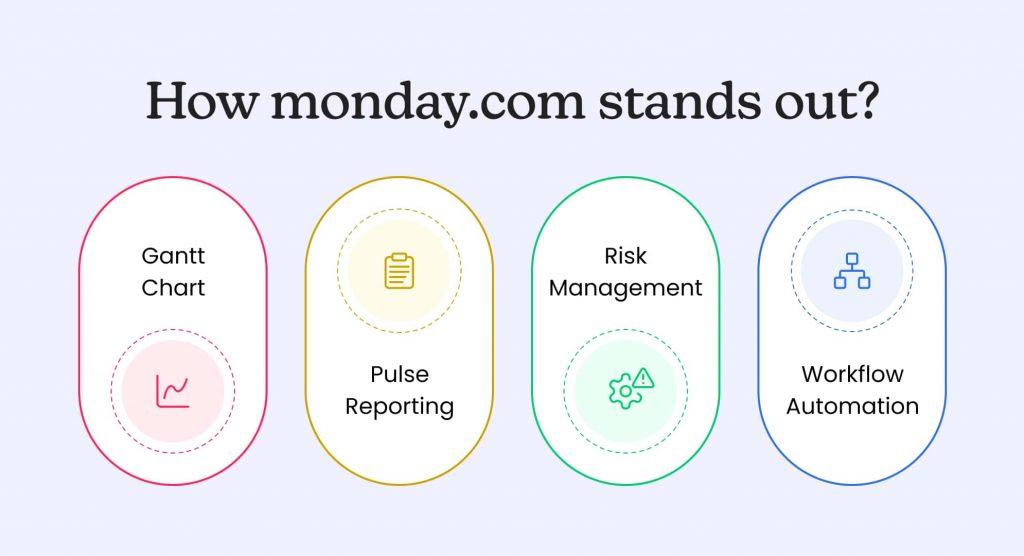
Visualizing project flow
monday.com’s Gantt chart is a powerful tool for visualizing project timelines and dependencies. This helps teams see the bigger picture, track progress, and adjust plans in real-time, leading to better collaboration and ensuring everyone stays on the same page.
Real-time insights
Pulse reporting provides real-time data on project status and team performance. This allows managers to identify issues and allocate resources effectively, keeping projects on track.
Proactive risk management
monday.com’s built-in risk management tools help teams proactively identify, assess, and mitigate potential risks. This proactive approach prevents unexpected issues from derailing projects.
Streamlined workflows
Workflow automation automates repetitive tasks, freeing up team members for more strategic work. By automating routine project management activities, this enhances efficiency and streamlines collaboration.
monday.com stands out as an all-in-one workspace and one of the strong alternatives to Notion, with advanced features like Gantt charts for visualizing task dependencies and project timelines. It enhances team collaboration by providing real-time insights through Pulse reporting, ensuring efficient project management.
Who Benefits Most from monday.com
monday.com is suitable for:
- Teams needing task management and advanced project management features
- Creating custom dashboards for comprehensive overviews
- Businesses looking for built-in automation capabilities
- Organizations prioritizing ease of use and quick setup
Final Thoughts
Notion and monday.com are both amazing project management tools, each with its unique strengths and weaknesses. However, ultimately, the right choice depends on your specific business needs and workflow preferences.
If you’re still uncertain and need guidance, such as why monday.com is the best choice for your business, consulting a monday.com specialist can be invaluable. Connect with TaskRhino to get all your questions answered and make an informed decision.
Our team of monday experts will understand your current business challenges, solutions that you need to smoothen the operations, and accordingly share how monday fits your requirements.
Get More Done with Less Effort
Our experts help you maximize productivity and streamline workflows with ease.
Frequently Asked Questions
Is monday similar to Notion?
Yes, monday is similar to Notion, except, monday.com is an all-in-one tool providing a complete project management solution. If you’re ready to invest some time in setting up a central hub for your business, Notion is an excellent choice. However, if you prefer a simple, feature-rich tool with advanced project management features, monday is a fantastic alternative.
What makes monday.com special?
What makes monday.com special is its robust functionality as a productivity tool that excels in managing task dependencies and promoting team collaboration. Its intuitive visual interface, customizable workflows, and versatile project-tracking capabilities stand out.
Is monday.com free?
Yes, monday.com offers a free plan that provides access to basic features suitable for individuals or small teams. However, for more advanced features and additional users, you may need to upgrade to one of their paid plans. Up to 2 users, the plan is free with unlimited sharing.
Does Notion integrate with monday?
Yes, Notion can integrate with monday.com. The monday importer allows you to bring your monday.com boards and all the data within them into Notion, making it easier to centralize your project management efforts within one tool. In case you encounter any issues with data export or migration to monday.com, contact TaskRhino for expert assistance.
What is the advantage of Notion?
Notion is a project management solution, that offers a highly customizable and adaptable workspace. Its features for task and project management, note-taking, goal setting, and time management enable users to significantly boost productivity and organization in their daily routines.
What is the downside of Notion?
Its steep learning curve, limited export options, limited integrations, pricing model, and customization challenges are potential weaknesses to consider when deciding whether Notion is the right tool for your project management needs.
Editor's Choice
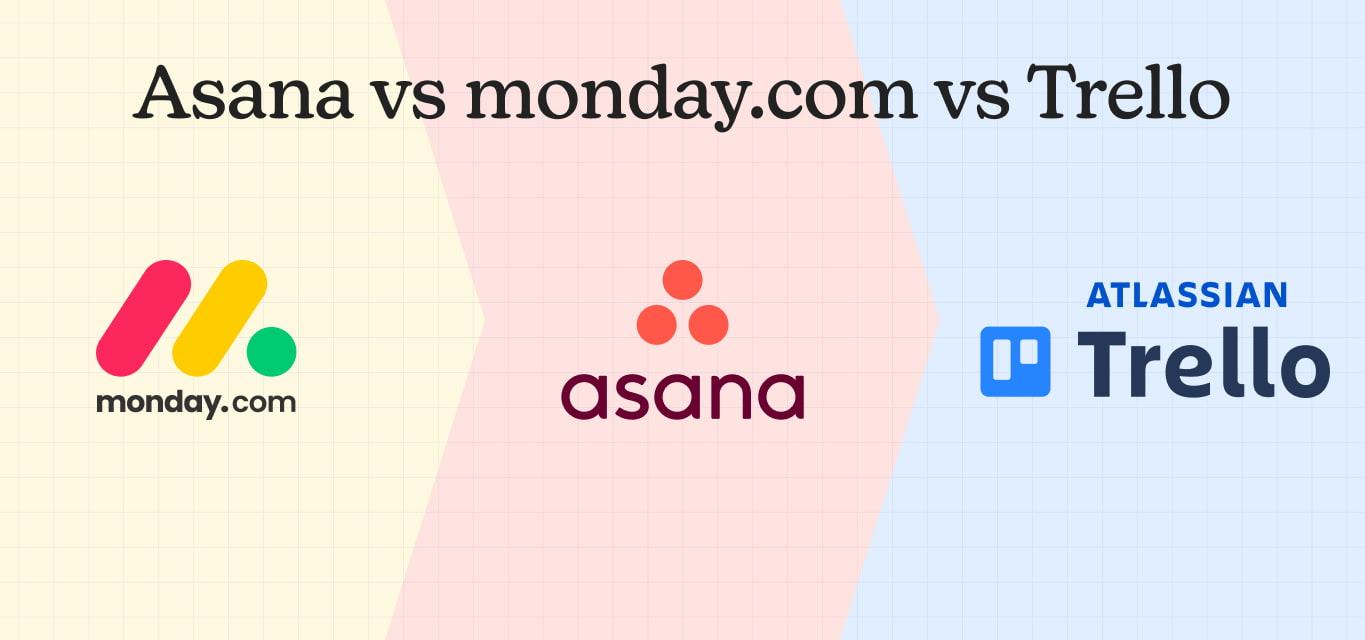
Asana vs monday vs Trello: Complete Comparison Guide 2025
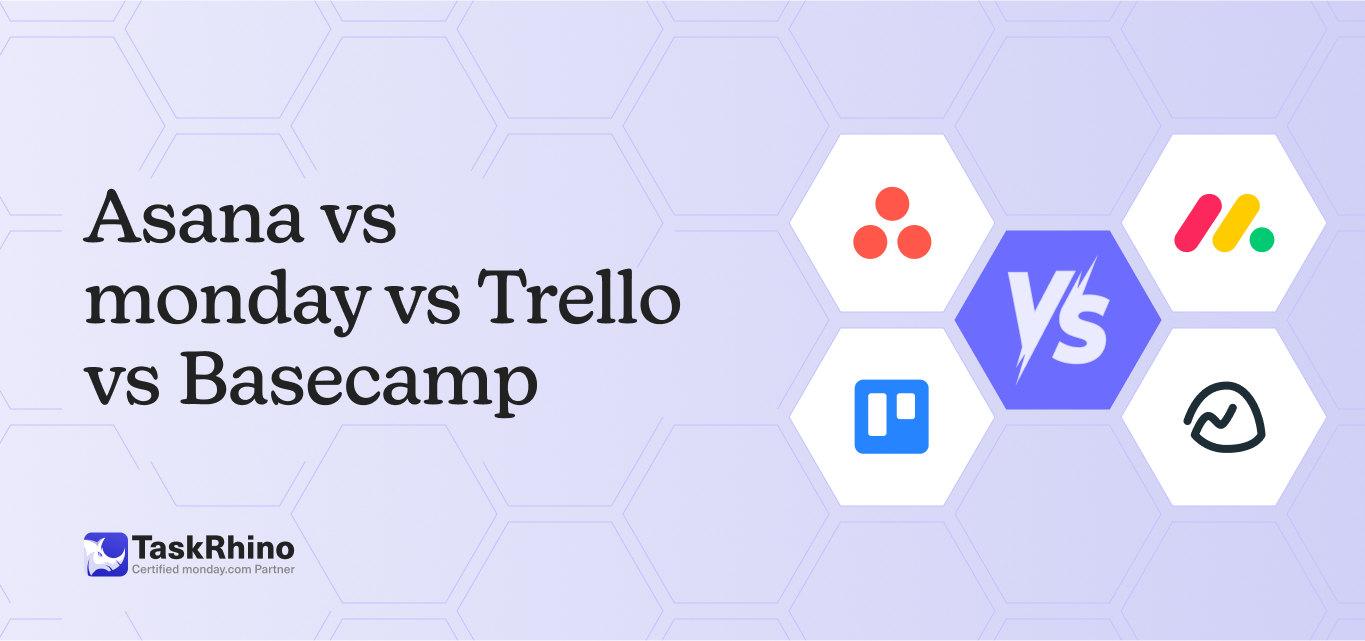
Asana vs Monday vs Trello vs Basecamp: Complete 2025 Comparison Guide
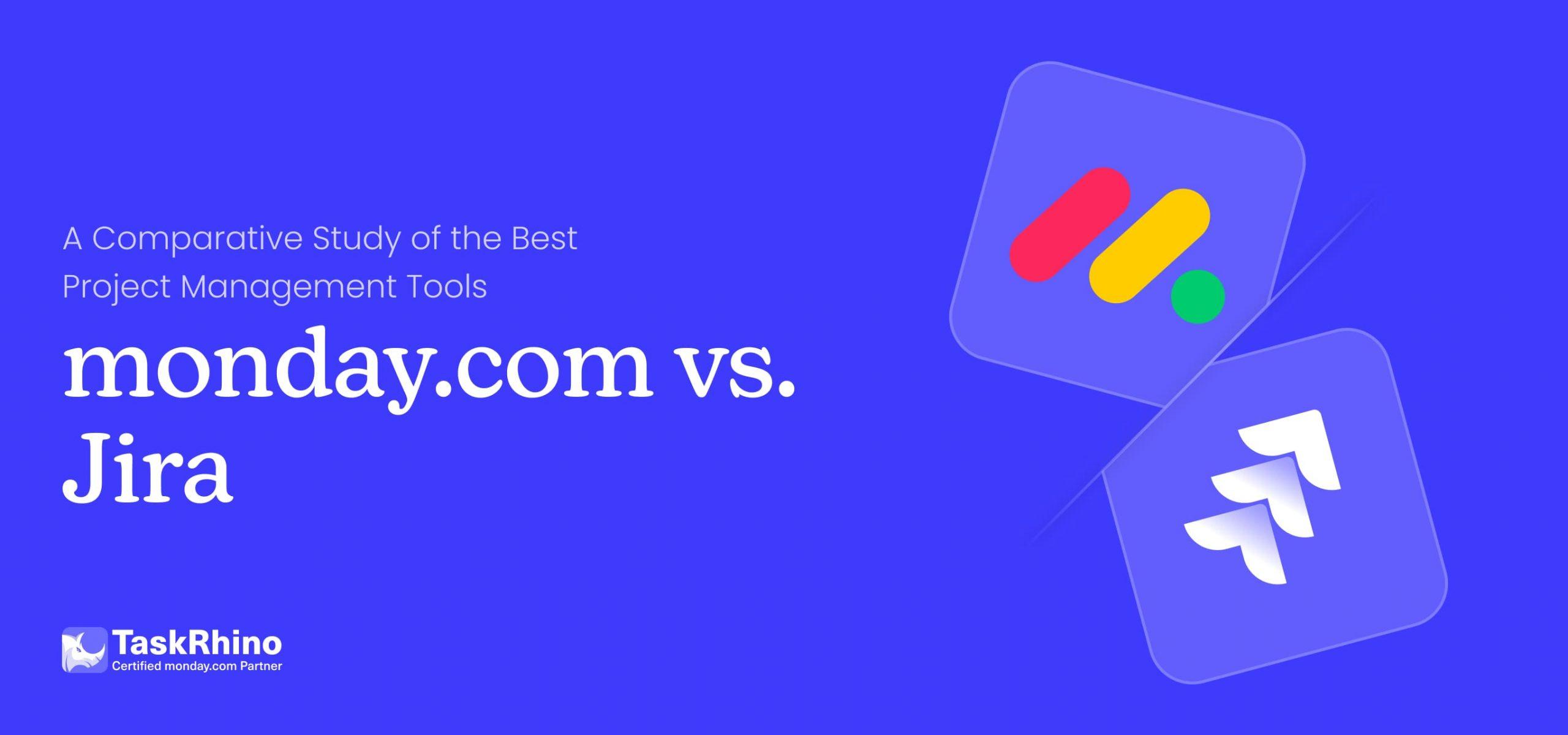
monday vs Jira 2025: Complete Feature Comparison & Decision Guide
